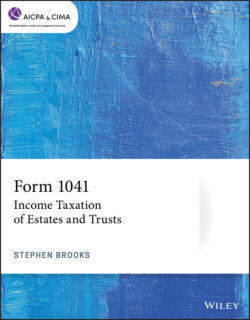Читать книгу Form 1041 - Stephen Brooks - Страница 37
На сайте Литреса книга снята с продажи.
Definitions
ОглавлениеThe following definitions are relevant to trusts:
Trustee — One who stands in a fiduciary or confidential relation to another; especially one who, having legal title to property, holds it in trust for the benefit of another and owes a fiduciary duty to that beneficiary.45
Settlor, grantor, trustor — Someone who creates a trust.46
Beneficiary — A person for whom benefit property is held in trust.47
Revocable trust — A trust in which the settlor reserves the right to terminate the trust and recover the trust property and any undistributed income.48
Irrevocable trust — A trust that cannot be terminated by the settlor once it is created.49
Principal — The corpus of the trust.50
Income — Amounts earned by the principal of the trust.
Remainder interest — The property that passes to a beneficiary after the expiration of an intervening income interest.51
Remainderman — Individual or entity entitled to the remainder interest.52
Testamentary trust — A trust that is created by a will and takes effect when the settlor (testator) dies.53
Inter vivos or living trust — A trust that is created and takes effect during the settlor's lifetime.54
Situs — The location or position (of something) for legal purposes.55
Rule against perpetuities — The common-law rule prohibiting a grant of an estate unless the interest must vest, if at all, no later than 21 years (plus a period of gestation to cover a posthumous birth) after the death of some person alive when the interest was created. The purpose of the rule was to limit the time that title to property could be suspended out of commerce because there was no owner who had the title to the property and who could sell it or exercise other aspects of ownership. If the terms of the contract or gift exceeded the time limits of the rule, the gift or transaction was void.56
